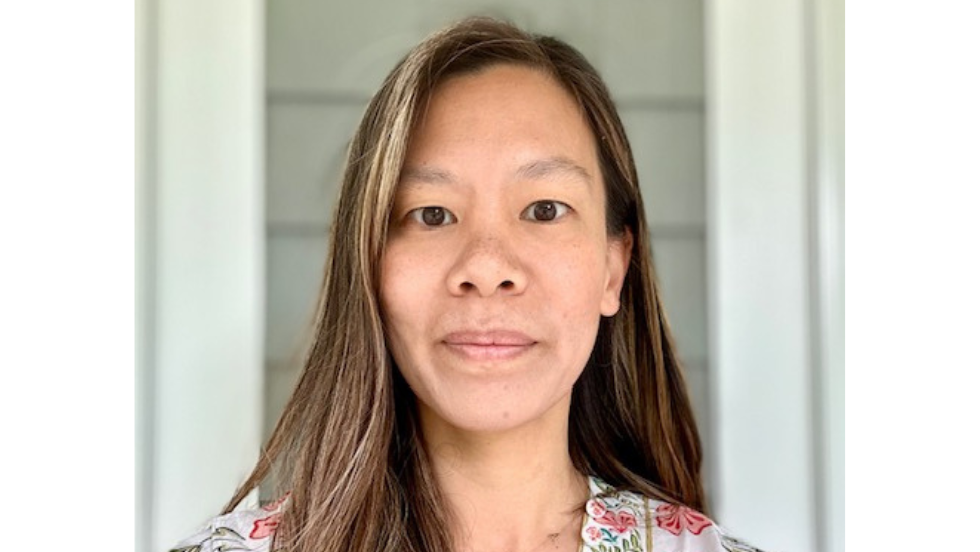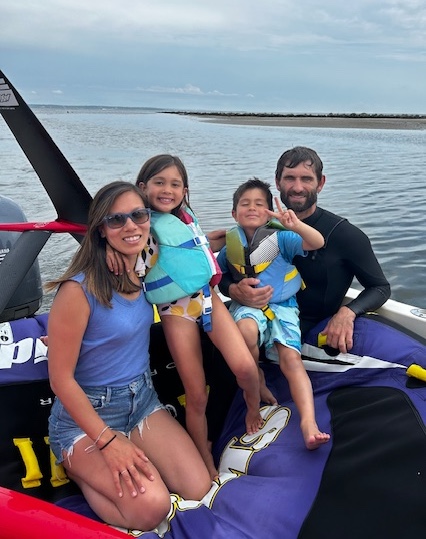The Clinician Cameo is a regular interview series with a clinician in the Brown Department of Psychiatry & Human Behavior (DPHB).

Tanya Tran, Ph.D., is an outpatient psychologist at Rhode Island Hospital and a clinical assistant professor of psychiatry and human behavior.
In this interview, Tran talks with DPHB about her decision to pursue the clinical side of psychology, the quirks of telehealth, and her active family life (which includes an Olympian spouse and a household Taylor Swift obsession).
How did you initially get interested in psychology?
I just remember always being interested in how people’s minds work – what makes people tick, what excites them and makes them feel different things. I’m not sure I knew what a psychologist was as a kid, though. Both my parents immigrated from Vietnam and they were both accountants, mainly because that was the practical thing to do. Psychology was outside their realm. But they knew that whatever I did, I would do it to its fullest extent and do it well. I took an AP psychology class in high school and loved it. I chose where to go to college based on opportunities in psychology.
It was cool to then actually do it and realize, ‘This does feel right.’ I have that feeling anytime I’m really proud of a patient who’s gotten through a challenge that they didn’t think they could. I’m just there to help guide them and help them develop the skills and confidence to do things that are important to them.
What brought you to Brown for your postdoctoral fellowship?
I took a position in the [Butler Hospital] psychosocial research program [then] with Lisa Uebelacker and Van Miller. It offered a really unique opportunity to do both research and clinical work. Oftentimes, you have to pick one or the other, but this allowed me to figure out what I wanted to do.
Getting to see the different pathways up close left me leaning toward clinical work. Obviously, both are really important. But I found that I like being able to work face-to-face with patients and make a direct impact in that way. I wasn’t patient enough for the lengthy research process – from grant-writing to research outcomes, and then to publication. And then, there can still often be a gap between research and application. I enjoy having first-hand contact with patients.
What was most valuable about your trainee experience?
I had a lot of independent time that allowed me to pursue moonlighting opportunities, more research and clinical work in different areas of psychology. I was able to get enough hours to get licensed fairly quickly. It allowed me the flexibility to explore things on my own.
.jpg)
What does your day-to-day work at Rhode Island Hospital look like?
I mainly see individual patients in outpatient care. I see a caseload of 7-9 patients pretty much back-to-back. Almost everyone I see has some mood disorder, some kind of anxiety disorder, often PTSD. We often get referrals from the hospitals, so often there are comorbid medical conditions. The population we see is very chronic.
I’m in the office one day a week. The rest is telehealth. On the one hand, telehealth has been really positive, because it’s increased access for patients. But in some ways, it’s made it easy for patients to remain in treatment with less intentional effort. It can be easy to plateau. You have to make sure to push them more, in some ways, to ensure they are purposeful in their motivation and goals for therapy .
Are there other ways that telehealth affects what you do?
In person, you can maintain someone’s attention more easily. There are fewer distractions. Then people have that drive home to debrief and come down from the session.
In telehealth, finding privacy can be challenging for some patients, especially when we’re talking about their family environment. On my side of things, it can be hard to sit at a computer for eight hours straight. I have to make sure I’m truly present.
You previously did research on the effects of social media on emotion regulation and well-being. Does that come up in your clinical work?
I think it comes up most prominently for patients who have strained relationships with family members. Prior to social media, if you had a falling out with someone, you might never cross paths with them again. Now, you have unlimited access to information about their lives. That can be difficult for some patients to navigate.
What are you doing when you’re not working?
My real answer is whatever the kids are doing. [laughing] I have two, 6 and 8, and my husband travels for work. So I’m a chauffeur, an organizer of activities, and a social director for my kids. And we just got a golden retriever puppy.
I used to have hobbies that I felt were self-defining. But I’m in this new life phase where I spend more time focused on relationship building, nurturing community, raising little humans and animals, learning about the numerous tasks that can be crammed into a 24-hour period, and navigating work-life balance, as well as the balance between caring for others and making time for myself.
